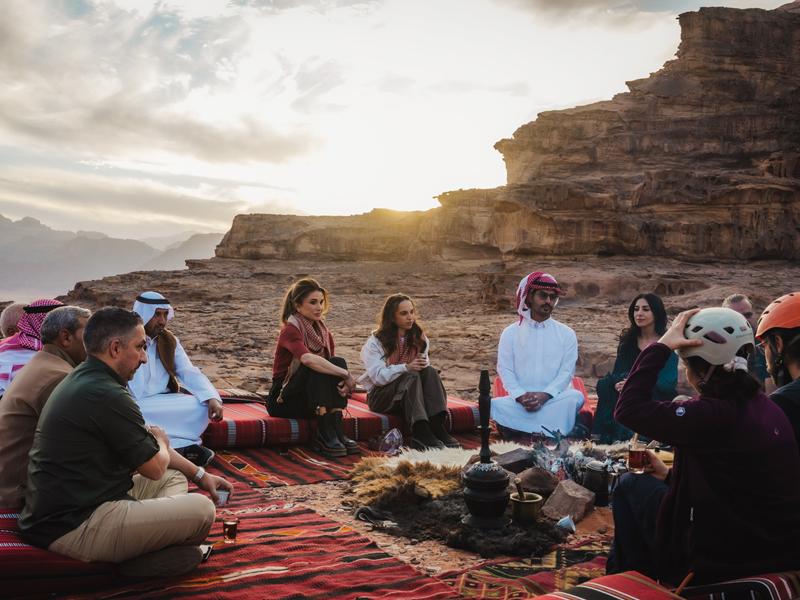(Office of Her Majesty, Press Department - Amman) As worshippers joined His Majesty King Abdullah at Al Hashemiyeen Mosque in a religious ceremony to mark Laylet Al Qader, the night on which the Holy Koran was revealed to Prophet Mohammad, Chief Islamic Justice Sheikh Izzeddine Khatib Tamimi delivered the “Amman Message” in defense of Islam as a faith of moderation and tolerance that rejects extremism and terrorism and believes in dialogue.
Jordan called for holding an Islamic conference next year to discuss and adopt the concepts included in the Amman Message which seeks to reveal a message of tolerance and humanity; rejecting extremism as a deviation from the true Islamic beliefs; thus, stressing the true values of Islam and promoting a proper understanding of the faith which honors all human beings and provides common ground among different faiths and peoples.
Tamimi highlighted Jordan's historic role under the rule of the Hashemites to repel assaults on Islam by refuting the fallacies against it and promoting a true understanding of the faith.
These efforts, which were intensified during the reign of His Majesty the late King Hussein, are inspired by the religious and historical legacy of the Hashemite dynasty.
“His Majesty King Abdullah II has continued this effort with the same steadfastness since the day he held the flag.
Today, His Majesty is determined to ward off Muslim marginalization and isolation in the global movement of human society. His goal is to assert what the world's 1.2 billion Muslims expect themselves to be; full partners in the development of human civilization, and in the progress of humanity in our age,” the document says. It affirms it is high time that the nation stands up to the challenges that emerged with the developments in the world arena in the past few years.
“We are aware of the dangers and challenges the Islamic nation is facing today at this difficult juncture of its course. Evils threaten its identity, incite disunity, tarnish its religion and assail its tenets; they attack fiercely the very message of Islam,” the message reads.
Damage to the true image did not only come from parties that belong to other cultures, the message asserts, but the faith has also been victimized by people who claim an Islamic identity while they commit acts of extremism that give their faith a bad name.
“Islam calls on Muslims to demonstrate tolerance and delight in human life; it opposes extremism, exaggeration and intransigence... We denounce extremism today, just as our forefathers relentlessly did throughout Islamic history.”
“On religious grounds, on moral grounds, we denounce the contemporary concept of terrorism which is associated with wrongful practices wherever they come from — including assaults on peaceful civilians, killing prisoners and the wounded, unethical practices such as the destruction of buildings, and ransacking cities,” the Amman Message said.
Following is the full text of the Amman Message:
AMMAN MESSAGE
In the name of God, Most Merciful, Most Compassionate; Prayers and Salutations upon His chosen Prophet, upon the Prophet’s household, his courageous companions, and all the apostles and prophets:
God Almighty said: “Mankind ! We created you from a pair of a male and female, and made you into nations and tribes that ye may know each other. The most honored of you in the sight of God is the most righteous of you” (Al Hujurat: 13).
Amman, the capital of the Hashemite Kingdom of Jordan, seizes the opportunity of this Holy Month of Ramadan, in which the Holy Koran was revealed, to issue a statement to the public, to our brethren in Muslim lands and in this whole world.
We are aware of the dangers and challenges the Islamic Nation is facing today at this difficult juncture of its course. Evils threaten its identity, incite disunity, tarnish its religion and assail its tenets; they attack fiercely the very message of Islam.
Some who attack Islam imagine it is their enemy. But it is not their enemy. Others, who claim to belong to Islam, have done gruesome and criminal acts in its name. The message that is under attack is the message of tolerance, revealed by the Almighty to His prophet Muhammad, God’s prayers and salutations be upon him, and carried after him by his orthodox successors and household members: a message of brotherhood and humanity; forming a righteous religion that embraces the entire sphere of human life, upholding what is good and forbidding what is wrong, accepting of others, and honoring all human beings.
Over many years, the Hashemite Kingdom of Jordan has sought to repel assaults on Islam by halting the fallacies against it and promoting true understanding of the faith. These efforts are inspired by the religious and historical legacy of the Hashemite monarchy, honored as direct descendants of the Prophet, the Messenger of God. For five decades, his late Majesty King Hussein Bin Talal, God rest his soul, persisted tirelessly to reform the image and support the unity of the world’s Muslims. His Majesty King Abdullah II has continued this effort with the same steadfastness since the day he held the flag.
Today, His Majesty is determined to ward off Muslim marginalization and isolation in the global movement of human society. His goal is to assert what the world’s 1.2 billion Muslims expect themselves to be: full partners in the development of human civilization, and in the progress of humanity in our age.
The Muslim faith is based on belief in one God and the message of His Prophet; the daily prayers by which we connect to our Creator; the Ramadan fast in which we resist and discipline the desires of the body; the Zakat charitable tax by which we help others; and the Haj pilgrimage to God’s House, Mecca, which represents the unity of the Nation (the Ummah), and is performed by those who are able. These obligations, regulating human behavior in all its dimensions, have created a strong and cohesive Nation and a great civilization. Equally important, they reflect deep principles that are needed for humanity’s own good: unity of the human race, equal rights and obligations, peace, security, social equality, the honoring of pledges, neighborliness and respect for others, and the protection of belongings and property.
Islam’s principles also provide common ground among different faiths and peoples. The origin of divine religions is one, and Muslims believe in all messengers of God; denying the message of any of them is a deviation from Islam.
This furnishes a wide platform upon which peoples of different faiths can meet together, with respect for others’ ideas and faiths, and act in common in the service of human society: “The messenger believeth in that which hath been revealed unto him from his Lord and (so do) the believers. Each one believeth in God and his angels and His scriptures and his messengers – We make no distinction between any of His messengers – and they say: We hear, and we obey. (Grant us) Thy forgiveness, our Lord. Unto thee is the journeying” (Al Baqara: 285).
Islam honors every human being, without distinction of color, race or religion: We have honored the sons of Adam, provided them transport on land and sea, sustained them with good things, and conferred on them special favors above a great part of our creation (Al Isra’a: 70)
Islam also affirms that Muslims, when spreading the call of God, are called to act gently on earth. Invite to the way of the Lord with wisdom and beautiful preaching and argue with them in ways that are best and most gracious (Al Nahl: 125)
Because the Islamic mission is based on reason, Muslims are to shun violence and cruelty, and speak with kindness and respect: It is part of the Mercy of God that thou dost deal gently with them, wert thou severe or harsh-hearted, they would have broken away from about thee. So pardon them and ask forgiveness for them and consult with them upon the conduct of affairs. (Aal Imran: 159)
Islam clarified that its message is to bring mercy to all peoples: We sent thee not save as a Mercy for all creatures (Al Anbiya’a: 107)
Prophet Muhammad, Peace Be Unto Him, emphasized the concepts of compassion and tenderness in Islam when he said, “Mercy from the Most Merciful is bestowed on those who have mercy on others, and those who have mercy on creations of God on earth, The Almighty in the Heavens will have mercy on you.”
Islam calls for treating others as one desires to be treated. It urges tolerance and forgiveness, qualities that elevate human life: The recompense for an injury is an injury equal thereto in degree, but if a person forgives and makes reconciliation, his reward is due from God (Shura: 40) Nor can Goodness and Evil be equal. Repel (Evil) with what is better: Then will be between whom and thee was hatred become as it were thy friend and intimate (Fussilat: 34)
Islam calls for treating others justly, safeguarding their rights and possessions: And let not the hatred of others to you make you swerve to wrong and depart from justice. Be just: that is next to piety (Al Maida: 8) God commands you to return trusts to their owners, and if you judge between people, you shall judge with justice (Al Nisa’: 58) “So give full measure and full weight and wrong not mankind in their goods, and work not confusion in the earth after the fair ordering thereof” (Al A’raf: 85)
Islam dictates respect for conventions and pledges, and condemns treachery and treason: Fulfill the Covenant of God when ye have entered into it, and break not your oaths after you have confirmed them, indeed you made God your surety (Al Nahl: 91)
Islam upholds human life. There is to be no fighting against non-fighters; no assault on civilians and their properties, on children in their mothers’ laps, on students in the schools, on older men and women. To assault the life of a human being is equivalent to assaulting the right to life of all – and this is one of the gravest sins, for life is the basis for the continuation of humanity.
If any one slew a person – unless it be for murder or for spreading mischief in the land – it would be as if he slew the whole people. And if any one saved a life, it would be as if he saved the life of the whole people (Al Ma’ida: 32)
Islam respects balance, moderation, and equanimity: Thus have we made of you an Ummat justly balanced, that ye might be witnesses over the nations, and the Apostle a witness over yourselves (Al Baqara: 143) The Prophet Muhammad, Peace Be Upon Him, said: “Facilitate and don’t hesitate, augur well and don’t shun away” (Hadeeth Shareef)
This is the faith that made historic advances in science, scholarship and intellectual life – achievements that empowered a great civilization, in whose achievements non-Muslims had their share, and which became the vehicle to bring knowledge for the West as well.
Islam calls on Muslims to demonstrate tolerance and delight in human life; it opposes extremism, exaggeration, and intransigence. These phenomena are veils against right thinking – they conceal the repercussions of one’s actions, and encourage a reckless disregard for religion, reason, and civilized behavior. Indeed, Islam rejects extremism as a deviation from true faith and a form of injustice.
Furthermore, it is not a trait that characterizes a particular nation; it is an aberration that has been experienced by all nations, races, and religions.
We denounce extremism today, just as our forefathers relentlessly did throughout Islamic history. Time after time, thy insisted on the importance of one clear truth: the ends do not justify the means. We speak this truth again today. Islam is a religion of ethics that seeks what is good for people in the entire world. Its principles are those of honor. The means for spreading Islam areethical means. And Islam can only be defended through ethical means.
The foundation of relations between Muslims and others is peace. In Islam, war is only justified by necessity and challenges. No fighting is permissible when others pose no aggression. Even then, the duty of Muslims is to treat others with justice and benevolence: God forbids you not, with regard to those who fight you not for your Faith, nor drive you out of your homes, from dealing kindly and justly with them: For God loveth those who are just (Al Mumtahina: 8) But if they cease, let there be no hostility except to those who practice oppression (Al Baqara: 193) On religious grounds, on moral grounds, we denounce the contemporary concept of terrorism which is associated with wrongful practices wherever they come from – including assaults on peaceful civilians, killing prisoners and the wounded, unethical practices such as the destruction of buildings, and ransacking cities. These despotic attacks on human life transgress the law of God, and we denounce them. As the Qur’an says: Take not life which God hath made sacred, except by way of justice and law (Al Anaam: 51)
Fighting injustice and realizing justice should be a legitimate undertaking through legitimate means. We call on the Nation (Ummah) to adopt what is necessary to achieve the strength and steadfastness needed to build itself and ensure the preservation of rights.
No human whose heart is filled with light could be an extremist. We decry the campaign that portrays Islam as a religion that encourages violence and institutionalizes terrorism. Throughout history, extremism has caused the destruction of great civilizations. The tree of civilization wilts, and hearts close, when malice takes hold. It is an evil alien to Islamic values of moderation and tolerance.
Today, we call on the international community to work seriously on implementing international law and ensuring respect for U.N. conventions and resolutions, ensuring that there are no double standards, that injustice is uprooted and that people’s rights are returned. Achieving this will contribute to uprooting the causes of violence, exaggeration, and extremism. The Islam that we are honored to belong to calls on us to be involved in modern society and contribute to its progress. To achieve that, Muslims reach out in brotherhood to all those who love justice, reason, and righteousness.
Islam guides us to express, earnestly, the realities of our lives, and to share the soundness of our faith and beliefs. This is God’s call for coexistence and piety.
Islam guides us to work on reforming the religious discourse of civilization in our countries, through well-designed, practical scientific plans that focus on rehabilitating preachers. These priorities will ensure broad public awareness among these preachers of the true spirit of Islam and its methodology in building human life, as well as providing them with knowledge of contemporary culture and how to deal with their communities. Say, ‘this is my way. I, and those who follow me, call for God with a clear vision of the truth.’ (Yusuf: 108)
Islam guides us to deal with the communication revolution, by utilizing the media in a sound, scientific manner, without weakness or emotional outbursts. Thus, we may respond to accusations stirred by enemies of Islam, while reaching all those who receive the messages of global media. Islam guides us to build up the Muslim individual through the best of education. Those who are confident in their knowledge and abilities are secure in their personalities, and through this self-confidence, present the distinguished outlook of Islam to the whole world.
Islam guides us to benefit from and contribute to the achievements of this age. Islam encourages science and technology; it is a pioneer in its approach to comprehensive development. The Islamic approach provides a balance in spiritual, economic, and social life; provides for human rights and basic liberties; ensures the individual’s right to live in dignity and security, guarantees basic needs, and administers society’s affairs in accordance with the principles of justice and consultation. Such an approach both benefits from and strengthens the mechanisms of modern democracy.
We attach great hope to the scholars of our Nation. It is they who will enlighten our youth – the generation that adorns our present age and will create and become our future. It is our scholars who will keep our youth from sliding down the paths of ignorance, corruption, close-mindedness and subordination, into the abyss of extremism. And it is our scholars who will hold a beacon to a different path – a path of tolerance, moderation, and goodness; guiding young people to the way of Islam and instituting its great values in their young hearts.
Indeed, as role models in their religious manners, conduct, and speech, our scholars can contribute to the renewal of the march of our entire Nation. By their exacting standards of science, positive visions of politics, and the grace to take all matters wisely and meticulously; and by bringing people together, not dividing them, by uniting hearts, not turning them away, and by raising humanity’s eyes to the horizons of fulfillment: in all these ways, our scholars will help our whole Nation meet the challenges of the 21st century.
Through such wisdom and achievement, Islam’s goodness, peace, and love will flow to all the peoples of the world. We pray to God: to provide our Islamic Nation with means of renaissance, prosperity and advancement; toshield it from the evils of extremism and closed minds; to preserve its rights, sustain its glory, and uphold its dignity. He is the best Lord and the Best Aid.
God Almighty says: “And (He commandeth you, saying): This is My straight path, so follow it. Follow not other ways, lest ye be parted from His way. This hath He ordained for you, tha ye may ward off (evil)” (Al An’aam: 153).
We conclude, thanking God, Lord of the worlds,
Amman The Hashemite Kingdom of Jordan Ramadan 1425 Hijri November 2004 AD


